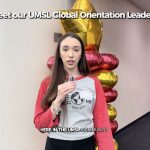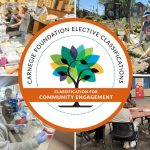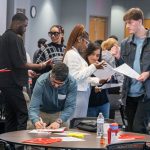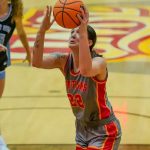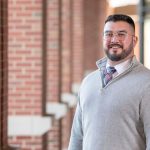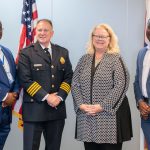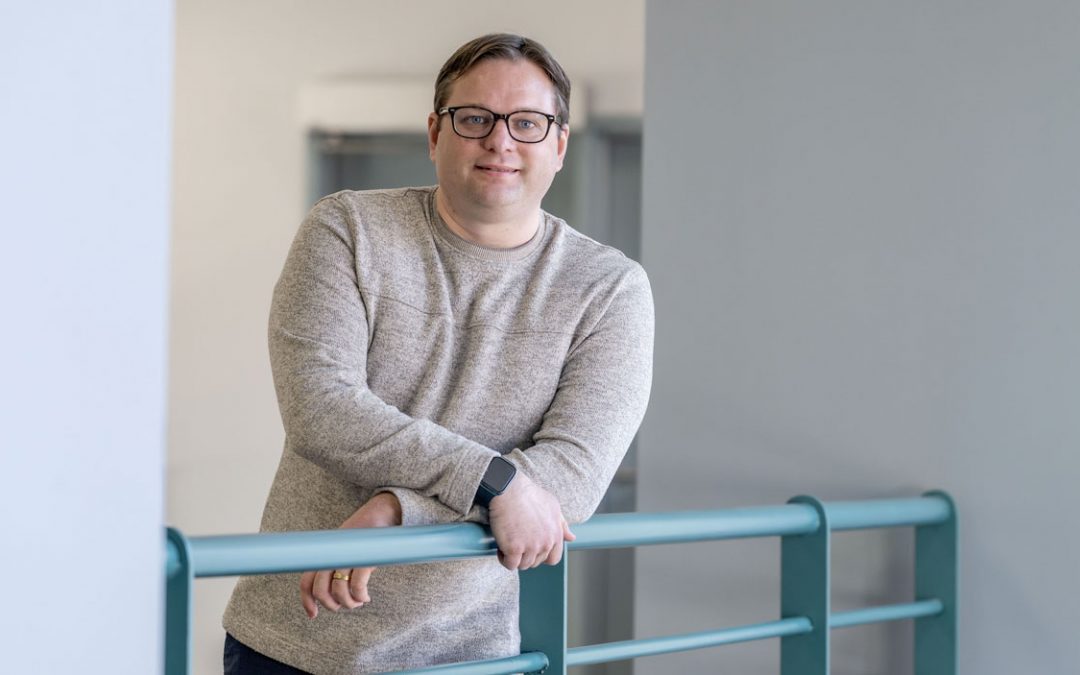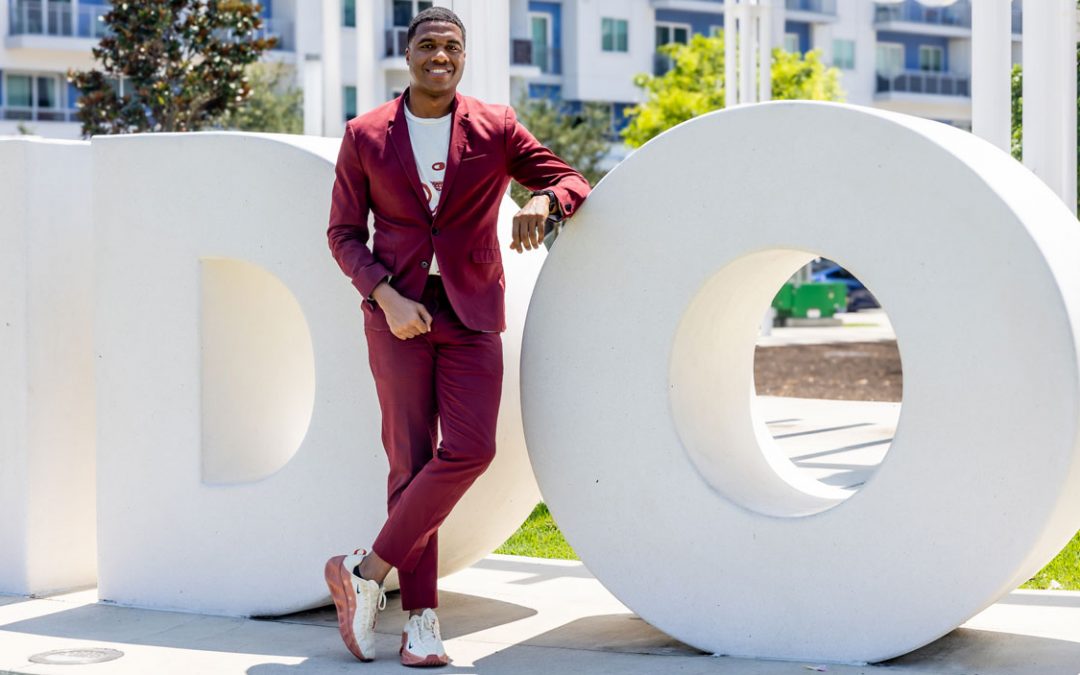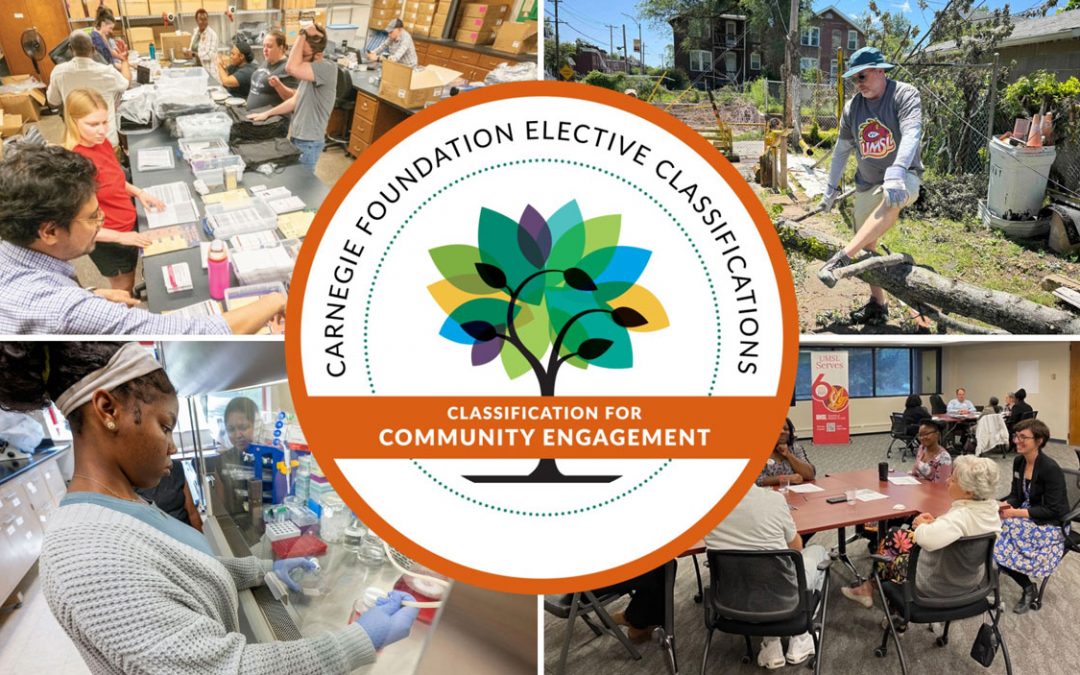
Niara Savage was motivated to pursue an EdSp in school psychology at UMSL after working with the St. Louis Teacher Residency. In addition to her interest in education, she is also a multimedia journalist. As an NPR Midwest Newsroom reporting fellow, she is working with the Missouri Independent and NPR Midwest Newsroom on an investigative series about the dangers of high levels of lead in Midwestern children. (Photo by August Jennewein)
When a nurse called Lisa Pascoe with the results of her toddler’s blood test, she was utterly shocked.
The test showed her son’s blood lead level was five times what federal health officials deemed elevated. Pascoe soon left her St. Louis home to avoid lead hazards, though the ordeal still weighs on her family.
A decade later, multimedia journalist and University of Missouri–St. Louis student Niara Savage is telling Pascoe’s story and informing the public about the dangers of high levels of lead in Midwestern children through Unleaded – a joint investigation by the Missouri Independent and the National Public Radio Midwest Newsroom.
Her work on the investigative series is part of her role as an NPR Midwest Newsroom reporting fellow. She was one of two young journalists selected in February for the new six-month fellowship, which is funded through a grant from the Ewing Marion Kauffman Foundation.
As a fellow, Savage is reporting for the Missouri Independent, a nonprofit, nonpartisan news outlet dedicated to investigative journalism.
“The issue of lead poisoning in children seemed really compelling to me because I know how damaging that can be for kids, and it impacts their whole life and ability to be successful,” she said. “To have the opportunity to be able to focus on that solely for six months with a great team of people and be able to investigate that while also learning from really great journalists in print and in radio – it’s something that made me really excited.”
It’s the latest entry on an already impressive resume.
Previously, Savage interned at St. Louis Public Radio; freelanced for Black news publications such as the Minnesota Spokesman-Recorder, Nashville Voice and Tennessee Tribune; and authored a young adult novel, “The Killing of Gregory Noble.” After teaching fifth grade for a year in St. Louis Public Schools, she is now pursuing an EdS in school psychology through UMSL’s College of Education.
In the future, she aims to work at the intersection of education, journalism and mental health to empower families to make more informed education choices.
Early beginnings
Savage’s interest in writing began in childhood. She was composing original poems as a second grader and continued to develop as a creative writer as she got older. Her family’s move from Harleysville, Pennsylvania, to the St. Louis area around 2015 inspired her to begin writing, “The Killing of Gregory Noble.”
The move came as Savage was entering her final year of high school and shortly after the killing of Michael Brown in Ferguson, Missouri. The events surrounding Brown’s death and the subsequent protest movement deeply affected Savage. She said the book, which is about police brutality, is a reflection on what she saw at the time and helped her process her emotions.
The influential period also awakened Savage’s political consciousness and led her to pursue a bachelor’s degree in political science at Fisk University, a small HBCU in Nashville.
“I really felt like at that time in my life, I was becoming more aware of a lot of the inequities that exist,” she said. “I felt like political science helped me to put into a historical perspective why things are the way they are now and how we’re still being impacted by that when it comes to some of the disparities that we see in the country.”
At Fisk, Savage combined her interests in writing and politics through journalism. Though she had no experience reporting, she convinced the editor of the Tennessee Tribune to let her write for the newspaper. The opportunity provided valuable experience and helped secure work with another local publication, the Nashville Voice.
She was working at the Voice in 2018 when her young journalism career came to a critical juncture. In July, an officer with the Metropolitan Nashville Police Department shot Daniel Hambrick in the back as he was fleeing, killing him. In September, the district attorney’s office filed a criminal homicide charge.
Savage covered the case closely, dutifully attending press conferences and speaking to the family’s attorney. Hambrick’s family reached out to the Voice’s editor to express their gratitude for her coverage.
“There’s nothing that I can do to bring him back, but I can at least tell his story,” she said of her work on the case. “I can at least allow people to hear the story. That was something that I really appreciated, and that’s when I started to be more interested in journalism.”
She continued freelancing for publications such as the Atlanta Black Star, Minnesota Spokesman-Recorder and the North Star while completing her degree and continued after graduation. However, graduating during the onset of the COVID-19 pandemic in 2020 complicated her next steps.
A new direction
Graduate school had been the plan, but Savage opted to return to St. Louis to be with her family due to the circumstances. While continuing to freelance, she joined the St. Louis Teacher Residency. The program consists of a yearlong classroom apprenticeship in St. Louis Public Schools with accompanying academic coursework.
“For me, it highlighted a lot of the problems that are happening in the school system and that we’re really not serving students the way they need to be served,” Savage said. “We’re failing them, so I think that that’s what’s driven me to school psych.”
Her decision to enroll in the College of Education’s school psychology program was motivated by its National Association of School Psychologists approved curriculum and UMSL’s proximity to her family. Since beginning the program last year, she’s enjoyed its focus on systems change and early intervention and prevention with students.
Savage has still kept busy with journalism while attending school. Last fall, she was a newsroom intern for St. Louis Public Radio, where she broadened her skills writing and voicing radio segments in addition to producing web pieces. She’s continuing to do so with the NPR fellowship.
Shining a light
The Unleaded series debuted on April 11, and over the next few months, it will examine the high lead levels found in children in Iowa, Kansas, Missouri and Nebraska by analyzing scientific research and government data and interviewing affected residents and experts.
The first report, which Savage co-authored, paints a stark picture of the problem. Missouri is the No. 1 lead producer in the country and ranks highly among states in lead water pipes per capita. The effects are evident even decades after the U.S. phased out leaded gasoline and banned the substance in new residential paint and water pipes. A 2012 report found that nearly 4,700 Missouri children had dangerous levels of lead in their blood.
Despite often reporting on difficult subject matter, Savage is driven to bring issues such as lead poisoning and police brutality to light in an effort to create change. In the future, Savage imagines leveraging her training in journalism, political science and school psychology to reform education at the community level.
She anticipates pursuing a PhD in clinical psychology after completing the EdS program at UMSL, and she eventually hopes to start a community space that provides guidance to parents and academic and mental health support to students.
“I feel that empowering and educating parents and families is going to be really crucial for actually helping our communities to overcome poverty,” Savage said. “I believe that journalism is just an avenue to get the information to people, the content, the knowledge, to help them to be able to make more empowered and informed decisions.
“As a writer, I would like to be able to equip parents with information they need about how to make better decisions about their kids and their kids’ education and things like that, be more involved in it. I’d love to be able to help make that information more accessible.”



